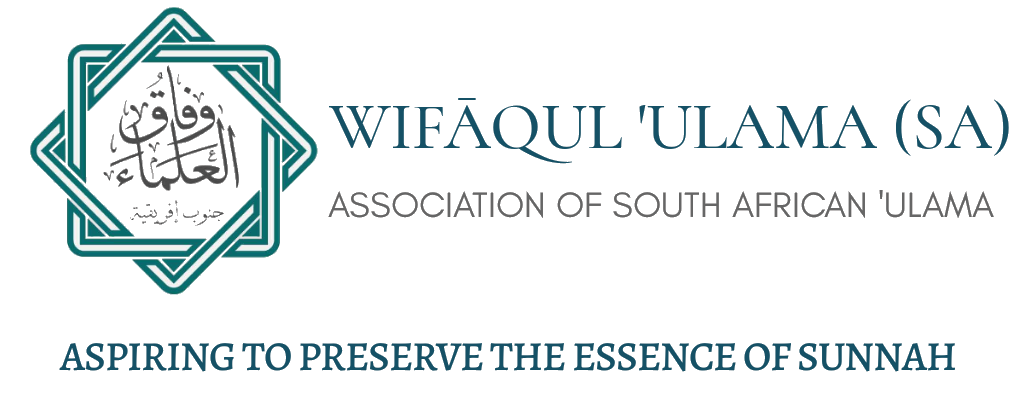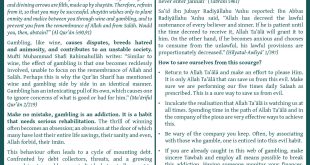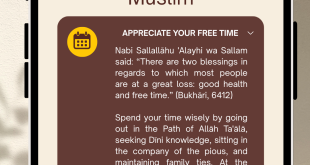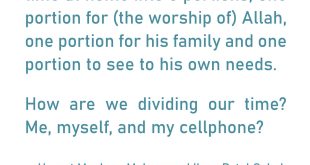“Let those who oppose the commands of the Messenger of Allāh be warned of a calamity or painful punishment that will afflict them” (Al-Qur’ān 24:63)
Muslims are defined by their total submission to the laws of Allāh Ta’ālā and our Beloved Nabi Sallallāhu ‘Alayhi Wa Sallam. Our standards for morality, right, wrong, justice, and injustice are all determined by our Pure Deen. We view everything through the prism of our Deen. We wholly and wholeheartedly submit to the laws of Allāh Ta’ālā. If something is prohibited or permitted, we regard it as such, irrespective of whether it appeals to our rationale or not. We do not apply our very limited logic to our Deen. That is the essence of our Imān (belief).
The sentiment of standing in solidarity with values that are openly at variance with the laws of Allāh Ta’ālā is a cause for great concern.
The forbidden, unnatural and repulsive promotion and support of homosexuality defies our commitment to Deen. It’s prohibition is clearly proven in the Qurān Karīm, Ahādīth of Nabi Sallallāhu ‘Alayhi Wa Sallam and through consensus of the entire Ummah. It is the requirement of our Imān that we distance ourselves from every evil. When Nabi Lūt ‘Alayhis-Salām was threatened with expulsion by his people who were guilty of homosexuality, he expressed his disgust, saying: “I despise your (shameful) deed.” (Al-Qur’ān 26:168) Nabi Sallallāhu ‘Alayhi Wa Sallam said: “When an evil deed is committed on Earth, the person who witnesses it but hates it is like the one who was absent from it (i.e. he will not be held accountable for it). And the person who is absent from it, but is pleased with it, is like one who witnessed it (i.e. he will share the burden of sin).” [Abū Dawūd, 4345].
Suggesting that a person has a right to choose to do what Allāh Ta’ālā has forbidden compromises our Imān, even if we are not inclined to commit that deed ourselves.
Our commitment and allegiance are sometimes tested by certain occurrences. Emotions should not prompt us to utter anything that puts our Imān in jeopardy.
Any person who regards homosexuality as permissible immediately leaves the fold of Islām.
He no longer remains a Muslim.
The person who considers such an apostate as Muslim also paves the way for his own exit from Islām. It is, therefore, very dangerous to show solidarity or support any idea that clearly opposes the Qur’ān and Hadith.
The wife of Lūt ‘Alayhis Salām was punished, not because she practised homosexuality, but because, together with her disbelief, she supported those who committed these acts. (Tafsīr Nasafi 2/578). May Allāh Ta’ālā protect us!
Remember, true life is the life of the hereafter! Why would anyone swap the beautiful gardens of Jannah for horrible torment in the fire of Jahannum! Nabi Sallallāhu ‘Alayhi Wa Sallam said: “The lowest form of punishment meted out in Jahannum will be for him under whose feet two burning charcoals will be placed; as a result of which his brains will boil.” (Muslim, 213)
If we inadvertently uttered anything in support of or signed any document that contains words of disbelief, we should immediately make Tawbah to Allāh Ta’ālā and renew our Imān.
Once, Hazrat Abu Bakr Radiyallāhu ‘Anhu asked Nabi Sallāllāhu ‘Alayhi Wa Sallam to teach him a Du’ā which would save him from disbelief. Nabi Sallallāhu ‘Alayhi Wa Sallam said: “Recite:
اللَّهُمَّ إِنِّيْ أَعُوْذُ بِكَ أَنْ أُشْرِكَ بِكَ وَأَنَا أَعْلَمُ، وَأَسْتَغْفِرُكَ لِماَ لَا أَعْلَمُ
“O Allāh, I seek Your protection that I ascribe partners to You knowingly. And I seek Your forgiveness from that which I do not know.” (Al Adabul Mufrad 716)
We should read this Du’ā daily as a precaution for having unwittingly said anything that puts our Imān in danger.
O Allāh, do not cause our hearts to deviate after having guided us and shower us with your special mercy. Āmīn
20 Sha’baan 1446 /20 February 2025 A0047
A0047 – Is My Reaction Justified
 Wifāq ul Ulāma (SA) ASSOCIATION OF SOUTH AFRICAN 'ULAMA
Wifāq ul Ulāma (SA) ASSOCIATION OF SOUTH AFRICAN 'ULAMA



